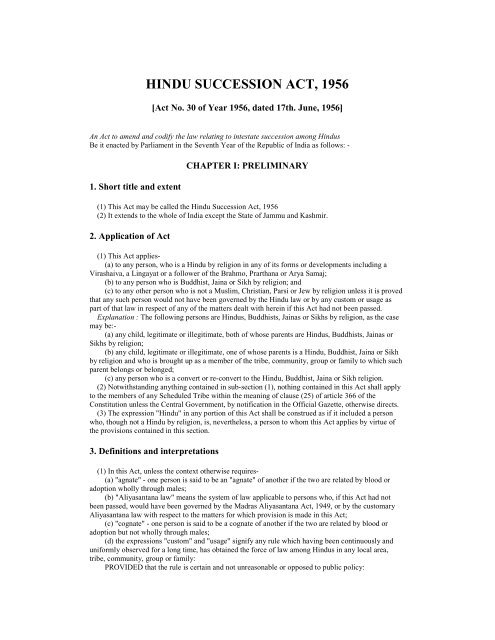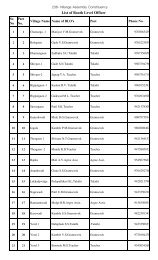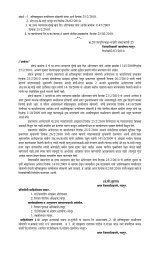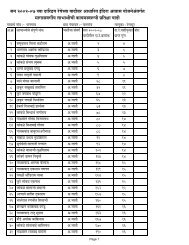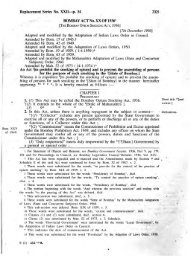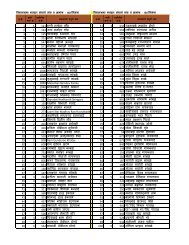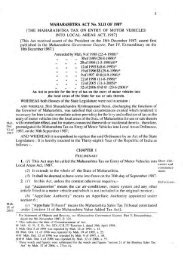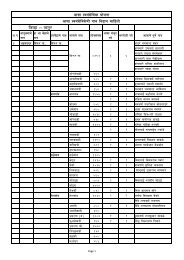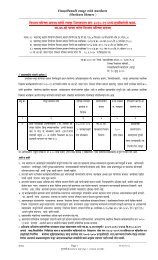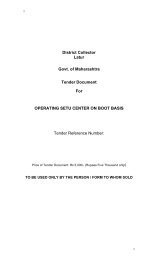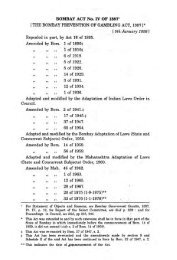HINDU SUCCESSION ACT, 1956
HINDU SUCCESSION ACT, 1956
HINDU SUCCESSION ACT, 1956
Create successful ePaper yourself
Turn your PDF publications into a flip-book with our unique Google optimized e-Paper software.
<strong>HINDU</strong> <strong>SUCCESSION</strong> <strong>ACT</strong>, <strong>1956</strong>[Act No. 30 of Year <strong>1956</strong>, dated 17th. June, <strong>1956</strong>]An Act to amend and codify the law relating to intestate succession among HindusBe it enacted by Parliament in the Seventh Year of the Republic of India as follows: -1. Short title and extentCHAPTER I: PRELIMINARY(1) This Act may be called the Hindu Succession Act, <strong>1956</strong>(2) It extends to the whole of India except the State of Jammu and Kashmir.2. Application of Act(1) This Act applies-(a) to any person, who is a Hindu by religion in any of its forms or developments including aVirashaiva, a Lingayat or a follower of the Brahmo, Prarthana or Arya Samaj;(b) to any person who is Buddhist, Jaina or Sikh by religion; and(c) to any other person who is not a Muslim, Christian, Parsi or Jew by religion unless it is provedthat any such person would not have been governed by the Hindu law or by any custom or usage aspart of that law in respect of any of the matters dealt with herein if this Act had not been passed.Explanation : The following persons are Hindus, Buddhists, Jainas or Sikhs by religion, as the casemay be:-(a) any child, legitimate or illegitimate, both of whose parents are Hindus, Buddhists, Jainas orSikhs by religion;(b) any child, legitimate or illegitimate, one of whose parents is a Hindu, Buddhist, Jaina or Sikhby religion and who is brought up as a member of the tribe, community, group or family to which suchparent belongs or belonged;(c) any person who is a convert or re-convert to the Hindu, Buddhist, Jaina or Sikh religion.(2) Notwithstanding anything contained in sub-section (1), nothing contained in this Act shall applyto the members of any Scheduled Tribe within the meaning of clause (25) of article 366 of theConstitution unless the Central Government, by notification in the Official Gazette, otherwise directs.(3) The expression "Hindu" in any portion of this Act shall be construed as if it included a personwho, though not a Hindu by religion, is, nevertheless, a person to whom this Act applies by virtue ofthe provisions contained in this section.3. Definitions and interpretations(1) In this Act, unless the context otherwise requires-(a) "agnate" - one person is said to be an "agnate" of another if the two are related by blood oradoption wholly through males;(b) "Aliyasantana law" means the system of law applicable to persons who, if this Act had notbeen passed, would have been governed by the Madras Aliyasantana Act, 1949, or by the customaryAliyasantana law with respect to the matters for which provision is made in this Act;(c) "cognate" - one person is said to be a cognate of another if the two are related by blood oradoption but not wholly through males;(d) the expressions "custom" and "usage" signify any rule which having been continuously anduniformly observed for a long time, has obtained the force of law among Hindus in any local area,tribe, community, group or family:PROVIDED that the rule is certain and not unreasonable or opposed to public policy:
PROVIDED FURTHER that in the case of a rule applicable only to a family it has not beendiscontinued by the family;(e) "full blood", "half blood" and "uterine blood"-(i) two persons said to be related to each other by full blood when they are descended from acommon ancestor by the same wife, and by half blood when they are descended from a commonancestor but by different wives;(ii) two persons are said to be related to each other by uterine blood when they are descendedfrom a common ancestress but by different husbands;Explanation : In this clause "ancestor" includes the father and "ancestress" the mother,(f) "heir" means any person, male or female, who is entitled to succeed to the property of anintestate under this Act;(g) "intestate" - a person is deemed to die intestate in respect of property of which he or she hasnot made a testamentary disposition capable of taking effect;(h) "marumakkattayam law" means the system of law applicable to persons-(a) who, if this Act had not been passed, would have been governed by the MadrasMarumakkattayam Act, 1932; the Travancore Nayar Act; the Travancore Ezhava Act; the TravancoreNanjinad Vellala Act; the Travancore Kshatriya Act; the Travancore Krishnanvaka MarumakkathayyeeAct; the Cochin Marumakkathayam Act; or the Cochin Nayar Act with respect to the matters for whichprovision is made in this Act; or(b) who belong to any community, the members of which are largely domiciled in the State ofTravancore-Cochin or Madras 1 [as it existed immediately before the lst November, <strong>1956</strong>,] and who, ifthis Act had not been passed, would have been governed with respect to the matters for whichprovision is made in this Act by any system of inheritance in which descent is traced through thefemale line;but does not include the Aliyasantana law;(i) " Nambudri law " means the system of law applicable to persons who if this Act had not beenpassed, would have been governed by the Madras Nambudri Act, 1932; the Cochin Nambudri Act; orthe Travancore Malayala Brahmin Act with respect to the matters for which provision is made in thisAct;(j) "related" means related by legitimate kinship:PROVIDED that illegitimate children shall be deemed to be related to their mother and to oneanother, and their legitimate descendants shall be deemed to be related to them and to one another; andany word expressing relationship or denoting a relative shall be construed accordingly.(2) In this Act, unless the context otherwise requires, words imparting the masculine gender shall notbe taken to include females.4. Overriding effect of Act(1) Save as otherwise expressly provided in this Act,-(a) any text, rule or interpretation of Hindu law or any custom or usage as part of that law in forceimmediately before the commencement of this Act shall cease to have effect with respect to any matterfor which provision is made in this Act;(b) any other law in force immediately before the commencement of this Act shall cease to applyto Hindus insofar as it is inconsistent with any of the provisions contained in this Act.(2) For the removal of doubts it is hereby declared that nothing contained in this Act shall be deemedto affect the provisions of any law for the time being in force providing for the prevention offragmentation of agricultural holdings or for the fixation of ceilings or for the devolution of tenancyrights in respect of such holdings.CHAPTER II: INTESTATE <strong>SUCCESSION</strong>GENERAL5. Act not to apply to certain propertiesThis Act shall not apply to-
(i) any property succession to which is regulated by the Indian Succession Act, 1925, by reason ofthe provisions contained in section 21 of the Special Marriage Act, 1954;(ii) any estate which descends to a single heir by the terms of any covenant or agreement entered intoby the Ruler of any Indian State with the Government of India or by the terms of any enactment passedbefore the commencement of this Act;(iii) the Valiamma Thampuran Kovilagam Estate and the Palace Fund administered by the PalaceAdministration Board by reason of the powers conferred by Proclamation (IX of 1124) dated 29thJune, 1949, promulgated by the Maharaja of Cochin.6. Devolution of interest of coparcenary propertyWhen a male Hindu dies after the commencement of this Act, having at the time of his death an interestin a Mitakshara coparcenary property, his interest in the property shall devolve by survivorship uponthe surviving members of the coparcenary and not in accordance with this Act:PROVIDED that, if the deceased had left him surviving a female relative specified in class I of theSchedule or a male relative specified in that class who claims through such female relative, the interestof the deceased in the Mitakshara coparcenary property shall devolve by testamentary or intestatesuccession, as the case may be, under this Act and not by survivorship.Explanation I: For the purposes of this section, the interest of a Hindu Mitakshara coparcener shall bedeemed to be the share in the property that would have been allotted to him if a partition of theproperty had taken place immediately before his death, irrespective of whether he was entitled to claimpartition or not.Explanation 2: Nothing contained in the proviso to this section shall be construed as enabling a personwho has separated himself from the coparcenary before the death of the deceased or any of his heirs toclaim on intestacy a share in the interest referred to therein.7. Devolution of interest in the property of a tarwad, tavazhi, kutumba, kavaruor illom(1) When a Hindu to whom the marumakkattayam or nambudri law would have applied if this Acthad not been passed dies after the commencement of this Act, having at the time of his or her death aninterest in the property of a tarwad, tavazhi or illom, as the case may be, his or her interest in theproperty shall devolve by testamentary or intestate succession, as the case may be, under this Act andnot according to the marumakkattayam or numbudri law.Explanation : For the purposes of this sub-section, the interest of a Hindu in the property of atarwad, tavazhi or illom shall be deemed to be the share in the property of the tarwad, tavazhi or illom,as the case may be, that would have fallen to him or her if a partition of that property per capita hadbeen made immediately before his or her death among all the members of tarwad, tavazhi or illom, asthe case may be, then living, whether he or she was entitled to claim such partition or not under themarumakkattayam or nambudri law applicable to him or her, and such share shall be deemed to havebeen allotted to him or her absolutely.(2) When a Hindu to whom the aliyasantana law would have applied if this Act had not been passed,dies after the commencement of this Act, having at the time of his or her death an undivided interest inthe property of a kutumba or kavaru, as the case may be his or her interest in the property shall devolveby testamentary or intestate succession, as the case may be, under this Act and not according to thealiyasantana law.Explanation : For the purposes of this sub-section, the interest of a Hindu in the property of kutumbaor kavaru shall be deemed to be the share in the property of the kutumba or kavaru as the case may be,that would have fallen to him or her if a partition of that property per capita had been madeimmediately before his or her death among all the members of the kutumba or kavaru, as the case maybe, then living, whether he or she was entitled to claim such partition or not under the aliyasantana law,and such share shall be deemed to have been allotted to him or her absolutely.(3) Notwithstanding anything contained in sub-section (1), when a sthanamdar dies after thecommencement of this Act, sthanam property held by him shall devolve upon the members of thefamily to which the sthanamdar belonged and the heirs of the sthanamdar as if the sthanam propertyhad been divided per capita immediately before the death of the sthanamdar among himself and all themembers of his family then living, and the shares falling to the members of his family and the heirs ofthe sthanamdar shall be held by them as their separate property.
Explanation: For the purposes of this sub-section, the family of a sthanamdar shall include everybranch of that family, whether divided or undivided, the male members of which would have beenentitled by any custom or usage to succeed to the position of sthanamdar if this Act had not beenpassed.8.General rules of succession in the case of malesThe property of a male Hindu dying intestate shall devolve according to the provisions of this Chapter-(a) firstly, upon the heirs, being the relatives specified in class I of the Schedule;(b) secondly, if there is no heir of class I, then upon the heirs, being the relatives specified in class IIof the Schedule;(c) thirdly, if there is no heir of any of the two classes, then upon the agnates of the deceased; and(d) lastly, if there is no agnate, then upon the cognates of the deceased.9. Order of succession among heirs in the ScheduleAmong the heirs specified in the Schedule, those in class I shall take simultaneously and to theexclusion of all other heirs; those in the first entry in class II shall be preferred to those in the secondentry; those in the second entry shall be preferred to those in the third entry; and so on in succession.10 Distribution of property among heirs in class I of the ScheduleThe property of an intestate shall be divided among the heirs in class I of the Schedule in accordancewith the following rules:Rule 1-The intestate’s widow, or if there are more widows than one, all the widows together, shall takeone share.Rule 2-The surviving sons and daughters and the mother of the intestate shall each take one share.Rule 3-The heirs in the branch of each pre-deceased son or each pre-deceased daughter of the intestateshall take between them one share.Rule 4-The distribution of the share referred to in Rule 3-(i) among the heirs in the branch of the pre-deceased son shall be so made that his widow (or widowstogether) and the surviving sons and daughters get equal portions; and the branch of his predeceasedsons gets the same portion;(ii) among the heirs in the branch of the pre-deceased daughter shall be so made that the survivingsons and daughters get equal portions.11. Distribution of property among heirs in class II of the ScheduleThe property of an intestate shall be divided between the heirs specified in any one entry in class II ofthe Schedule so that they share equally.12. Order of succession among agnates and cognatesThe order of succession among agnates or cognates, as the case may be, shall be determined inaccordance with the rules of preference laid down hereunder:Rule 1- Of two heirs, the one who has fewer or no degrees of ascent is preferred.Rule 2- Where the number of degrees of ascent is the same or none, that heir is preferred who hasfewer or no degrees of descent.Rule 3- Where neither heirs is entitled to be preferred to the other under Rule 1 or Rule 2 they takesimultaneously.13. Computation of degrees(1) For the purposes of determining the order of succession among agnates or cognates, relationshipshall be reckoned from the intestate to the heir in terms of degrees of ascent or degrees of descent orboth, as the case may be.
(2) Degrees of ascent and degrees of descent shall be computed inclusive of the intestate.(3) Every generation constitutes a degree either ascending or descending.14. Property of a female Hindu to be her absolute property(1) Any property possessed by a Female Hindu, whether acquired before or after the commencementof this Act, shall be held by her as full owner thereof and not as a limited owner.Explanation: In this sub-section, "property" includes both movable and immovable propertyacquired by a female Hindu by inheritance or devise, or at a partition, or in lieu of maintenance orarrears of maintenance, or by gift from any person, whether a relative or not, before, at or after hermarriage, or by her own skill or exertion, or by purchase or by prescription, or in any other mannerwhatsoever, and also any such property held by her as stridhana immediately before thecommencement of this Act.(2) Nothing contained in sub-section (1) shall apply to any property acquired by way of gift or undera will or any other instrument or under a decree or order of a civil court or under an award where theterms of the gift, will or other instrument or the decree, order or award prescribe a restricted estate insuch property.15. General rules of succession in the case of female Hindus(1) The property of a female Hindu dying intestate shall devolve according to the rules set out insection 16 :(a) firstly, upon the sons and daughters (including the children of any pre-deceased son ordaughter) and the husband;(b) secondly, upon the heirs of the husband;(c) thirdly, upon the mother and father;(d) fourthly, upon the heirs of the father; and(e) lastly, upon the heirs of the mother.(2) Notwithstanding anything contained in sub-section (1)-(a) any property inherited by a female Hindu from her father or mother shall devolve, in theabsence of any son or daughter of the deceased (including the children of any pre-deceased son ordaughter) not upon the other heirs referred to in sub-section (1) in the order specified therein, but uponthe heirs of the father; and(b) any property inherited by a female Hindu from her husband or from her father-in-law shalldevolve, in the absence of any son or daughter of the deceased (including the children of any predeceasedson or daughter) not upon the other heirs referred to in sub-section (1) in the order specifiedtherein, but upon the heirs of the husband.16. Order of succession and manner of distribution among heirs of a femaleHinduThe order of succession among the heirs referred to in section 15 shall be, and the distribution of theintestate’s property among those heirs shall take place, according to the following rules, namely:-Rule 1- Among the heirs specified in sub-section (1) of section 15, those in one entry shall be preferredto those in any succeeding entry and those including in the same entry shall take simultaneously.Rule 2- If any son or daughter of the intestate had pre-deceased the intestate leaving his or her ownchildren alive at the time of the intestate’s death, the children of such son or daughter shall takebetween them the share which such son or daughter would have taken if living at the intestate’s death.Rule 3-The devolution of the property of the intestate on the heirs referred to in clauses (b), (d) and (e)of sub-section (1) and in sub-section (2) of section 15 shall be in the same order and according to thesame rules as would have applied if the property had been the father’s or the mother’s or the husband’sas the case may be, and such person had died intestate in respect thereof immediately after theintestate’s death.17. Special provisions respecting persons governed by Marumakkattayam andAliyasantana laws
The provisions of sections 8, 10, 15 and 23 shall have effect in relation to persons who would havebeen governed by the marumakkattayam law or aliyasantana law if this Act had not been passed as if-(i) for sub-clauses (c) and (d) of section 8, the following had been substituted, namely:-"(c) thirdly, if there is no heir of any of the two classes, then upon his relatives, whether agnates orcognates.";(ii) for clauses (a) to (e) of sub-section (1) of section 15, the following had been substituted,namely:-"(a) firstly, upon the sons and daughters (including the children of any pre-deceased son ordaughter) and the mother;(b) secondly, upon the father and the husband;(c) thirdly, upon the heirs of the mother;(d) fourthly, upon the heirs of the father; and(e) lastly, upon the heirs of the husband.";(iii) clause (a) of sub-section (2) of section 15 had been omitted;(iv) section 23 had been omitted.GENERAL PROVISIONS RELATING TO <strong>SUCCESSION</strong>18. Full blood preferred to half bloodHeirs related to an intestate by full blood shall be preferred to heirs related by half blood, if the natureof the relationship is the same in every other respect.19. Mode of succession of two or more heirsIf two or more heirs succeed together to the property of an intestate, they shall take the property-(a) save as otherwise expressly provided in this Act, per capita and not per stripes; and(b) as tenants-in-common and not as joint tenants.20. Right of child in wombA child who was in the womb at the time of death of an intestate and who is subsequently born alivehas the same right to inherit to the intestate as if he or she had been born before the death of theintestate, and the inheritance shall be deemed to vest in such a case with effect from the date of thedeath of the intestate.21. Presumption in cases of simultaneous deathsWhere two persons have died in circumstances rendering it uncertain whether either of them, and if sowhich, survived the other, then for all purposes affecting succession to property, it shall be presumed,until the contrary is proved, that the younger survived the elder.22. Preferential right to acquire property in certain cases(1) Where, after the commencement of this Act, interest in any immovable property of an intestate,or in any business carried on by him or her, whether solely or in conjunction with others, devolve uponto two or more heirs specified in class I of the Schedule, and any one of such heirs proposes to transferhis or her interest in the property or business, the other heirs shall have a preferential right to acquirethe interest proposed to be transferred.(2) The consideration for which any interest in the property of the deceased may be transferred underthis section shall, in the absence of any agreement between the parties, be determined by the court onapplication being made to it in this behalf, and if any person proposing to acquire the interest is notwilling to acquire it for the consideration so determined, such person shall be liable to pay all costs ofor incident to the application.(3) If there are two or more heirs specified in class I of the Schedule proposing to acquire anyinterest under this section, that heir who offers the highest consideration for the transfer shall bepreferred.
Explanation : In this section, "court" means the court within the limits of whose jurisdiction theimmovable property is situate or the business is carried on, and includes any other court which theState Government may, by notification in the Official Gazette, specify in this behalf.23. Special provision respecting dwelling housesWhere a Hindu intestate has left surviving him or her both male and female heirs specified in class I ofthe Schedule and his or her property includes a dwelling-house wholly occupied by members of his orher family, then, notwithstanding anything contained in this Act, the right of any such female heir toclaim partition of the dwelling-house shall not arise until the male heirs choose to divide theirrespective shares therein; but the female heir shall be entitled to a right of residence therein:PROVIDED that where such female heir is a daughter, she shall be entitled to a right of residence inthe dwelling-house only if she is unmarried or has been deserted by or has separated from her husbandor is a widow.24. Certain widows remarrying may not inherit as widowsAny heir who is related to an intestate as the widow of a pre-deceased son, the widow of a predeceasedson of a pre-deceased son or the widow of a brother shall not be entitled to succeed to theproperty of the intestate as such widow, if on the date the succession opens, she has re-married.25. Murderer disqualifiedA person who commits murder or abets the commission of murder shall be disqualified from inheritingthe property of the person murdered, or any other property in furtherance of the succession to which heor she committed or abetted the commission of the murder.26. Convert’s descendants disqualifiedWhere, before or after the commencement of this Act, a Hindu has ceased or ceases to be a Hindu byconversion to another religion, children born to him or her after such conversion and their descendantsshall be disqualified from inheriting the property of any of their Hindu relatives, unless such children ordescendants are Hindus at the time when the succession opens.27. Succession when heir disqualifiedIf any person is disqualified from inheriting any property under this Act, it shall devolve as if suchperson had died before the intestate.28. Disease, defect, etc. not to disqualifyNo person shall be disqualified from succeeding to any property on the ground of any disease, defect ordeformity, or save as provided in this Act, on any other ground whatsoever.ESCHEAT29. Failure of heirsIf an intestate has left no heir qualified to succeed to his or her property in accordance with theprovisions of this Act, such property shall devolve on the government; and the government shall takethe property subject to all the obligations and liabilities to which an heir would have been subjected.30. Testamentary successionChapter III: TESTAMENTARY <strong>SUCCESSION</strong>
2 [* * *] Any Hindu may dispose of by will or other testamentary disposition any property, which iscapable of being so disposed of by him, in accordance with the provisions of the Indian SuccessionAct, 1925, or any other law for the time being in force and applicable to Hindus.Explanation: The interest of a male Hindu in a Mitakshara coparcenary property or the interest of amember of a tarwad, tavazhi, illom, kutumba or kavaru in the property of the tarwad, tavazhi, illom,kutumba or kavaru shall notwithstanding anything contained in this Act or in any other law for the timebeing in force, be deemed to be property capable of being disposed of by him or by her within themeaning of this 3 [section.]4 [* * *]31. RepealCHAPTER IV: REPEAL[Rep. by Repealing and Amending Act, 1960 (58 of 1960)]THE SCHEDULE[Section 8]HEIRS IN CLASS I AND CLASS IICLASS ISon; daughter; widow; mother; son of a pre-deceased son; daughter of a pre-deceased son; son of a predeceaseddaughter; daughter of a pre-deceased daughter; widow of a pre-deceased son; son of a predeceasedson of a pre-deceased son; daughter of a pre-deceased son of a pre-deceased son; widow of apre-deceased son of a pre-deceased son.CLASS III. Father.II. (1) Son’s daughter’s son, (2) son’s daughter’s daughter, (3) brother, (4) sister.III. (1) Daughter’s son’s son, (2) daughter’s son’s daughter, (3) daughter’s daughter’s son, (4)daughter’s daughter’s daughter.IV. (1) Brother’s son, (2) sister’s son, (3) brother’s daughter, (4) sister’s daughter.V. Father’s father; father’s mother.VI.. Father’s widow; brother’s widow.VII. Father’s brother; father’s sister.VIII. Mother’s father; mother’s mother.IX. Mother’s brother; mother’s sister.Explanation : In this Schedule, references to a brother or sister do not include references to a brotheror sister by uterine blood.Foot Notes1 Inserted by the Adaptation of Laws (No. 3) Order, <strong>1956</strong>.2 Parantheses and figure "(1)" omitted by Act No. 58 of 1960.3 Substituted for the word "Sub-section" by Act No. 56 of 1974.4 Sub-section (2) omitted by Act No. 78 of <strong>1956</strong>.


